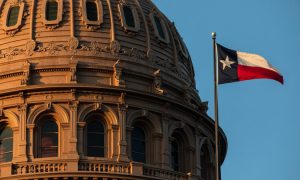Two state senators from the Bexar County area voted in favor of the bill: Judith Zaffrini (D-San Antonio) and Donna Campbell (R-New Braunfels), while two others, Jose Menendez (D-San Antonio) and Roland Gutierrez (D-San Antonio) voted against it.
The intent of the bill, according to SB 13’s authors, is to address the issue of sexually explicit content in school libraries and affirm a parent’s right to access school records of the materials their child checks out from the school library.
But school librarian advocates from San Antonio say school districts already have systems in place to handle book challenges from parents, and the bill could lead to greater marginalization of minority group students such as LGBTQ+ students or Black and Hispanic students.
Lucy Podmore, a public school librarian and former chair of the Texas Association of School Librarians, says one of her “concerns” with the bill is that it would give more power to a handful of outspoken parental voices instead of the majority of parents who aren’t uncomfortable with what their children might be reading.
“We need to make sure that if this bill is about parental rights, that all are represented,” Podmore said. “What we have seen in the past when committees have been formed is… a small group of people with an outsized voice that are making decisions.”
Another of Podmore’s concerns is that the bill would increase the time it takes for a school librarian to order new books and have them on school shelves.
Between the time it currently takes to curate a book list, get it approved and have the order fulfilled, it might take between six to eight weeks to get a new book in a school library’s catalogue, Podmore said. Under SB 13, a parent committee would have to approve the book list first, and the list would have to be on a public viewing platform for at least 30 days before being sent to the school board for final approval.
School librarians already do all of this review work, Podmore said.
“We review in our journals, — our professional journals that review books — we take time to read those reviews, we ensure that they fit within our curriculum, or they reflect our community, or they are popular authors that our students have enjoyed,” Podmore, who works as a school librarian, said.
Laura Sisson, a school librarian at CAST Tech/Fox Tech High School in San Antonio Independent School District, agrees that the law is “redundant” and said state lawmakers need to trust librarians.
In order to be a certified school librarian in Texas, librarians need to have a master’s degree, two years of classroom experience, complete an an approved Educator Preparation Program and pass another state exam for school librarians.
Usually, Sisson orders between 500 and 1,000 books a school year, but SB 13 would likely reduce the amount of books she could order for her students.
For Sisson, managing a school library is “all about balance.” For example, if she orders books about President Barack Obama and President Joe Biden, both Democrats, Sisson said she also buys books about President Donald Trump, a Republican.
When parents have concerns about something in her library catalogue, Sisson said she talks with them and “honors” a parent’s request to limit their child’s access to certain material.
But Sisson also believes students should have access to books that reflect different perspectives, even if they don’t match their own experiences. Not having access to books that depict a diverse range of reading material makes students “less empathetic,” she said.
If enacted, Sisson said SB 13 would make books about race, gender, LGBTQ+ communities and sexual education “targets of scrutiny and overzealous parents.”
The bill comes at a time when efforts to “ban” or remove certain books from school libraries in Texas have already been well underway. PEN American, an organization tracking book bans around the country, said Texas banned roughly 540 books during the 2023-24 school year. Of those books, nearly half had characters that are people of color and almost 40% included LGBTQ characters.
Before that, North East Independent School District removed more than 100 book s in 2022 from their shelves as part of a review process of 432 books targeted by a state Republican lawmaker at the time, replacing them with books on similar subjects.
No books have been successfully challenged this school year, spokesperson for the district Aubrey Chancellor said. NEISD has an online system where anyone concerned, whether students, parents or teachers, can submit a book title — and the district will move that book to the top of its review list.
SB 13 would also build on legislation passed during the last legislative session that aims to regulate school libraries and their content. House Bill 900, also known as the READER Act, restricts certain content from school libraries by requiring a rating system to be put in place, although the law has faced challenges in the federal courts leading to parts of the law not being enforced.
Another bill filed during the current legislative session aiming to regulate school libraries is House Bill 183 , which would allow parents to bypass their district reconsideration procedures and take up book challenges with the State Board of Education.
Whatever decision the SBOE makes, whether it’s to keep or remove a book, would then be implemented statewide. HB 183 was referred to the House’s public education committee but a hearing for that bill has not been scheduled.








